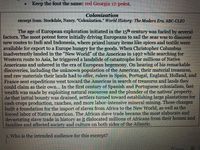Question
thumb_up100%
I just need question one answered please and thank you

Transcribed Image Text:• Keep the font the same: red Georgia 12 point.
Colonization
excerpt from: Stockdale, Nancy. "Colonization." World History: The Modern Era. ABC-CLIO
The age of European exploration initiated in the 15th century was fueled by several
factors. The most potent force initially driving Europeans to sail the seas was to discover
new routes to Indi and Indonesia, where prized luxury items like spices and textile were
available for export to a Europe hungry for the goods. When Christopher Columbus
inadvertently landed in the "New World" of the Americas in 1492 while searching for
Western route to Asia, he triggered a landslide of catastrophe for millions of Native
Americans and ushered in the era of European hegemony. On hearing of his remarkable
discoveries, including the unknown population of the Americas, their material treasures,
and raw materials their lands had to offer, rulers in Spain, Portugal, England, Holland, and
France sent expeditions west toward the Americas in search of treasures and lands they
could claim as their own... In the first century of Spanish and Portuguese colonialism, fast
wealth was made by exploiting natural resources and the plunder of the natives' property.
As that initial bounty was drained, settlers turned toward establishing large plantations for
cash crops production, ranches, and more labor-intensive mineral mining. Those changes
built a foundation for the import of slaves from Africa to the New World, as well as the
forced labor of Native American. The African slave trade became the most elaborate and
devastating slave trade in history as it dislocated millions of Africans from their homes and
families and affected society and culture on both sides of the Atlantic.
1. Who is the intended audience for this excerpt?
N Forus
Expert Solution
arrow_forward
Step 1
Nancy L Stockdale is a scholar of Middle Eastern History at the University of North Texas. She has authored numerous books on history. She is also a founding member of the Contemporary Arab and Muslim Cultural Studies Initiative at UNT
Step by stepSolved in 2 steps
